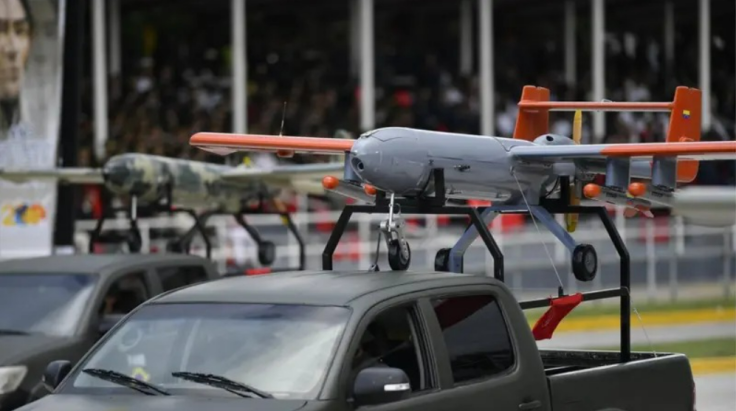
The relationship between the United States and Venezuela has sharply deteriorated in recent weeks. At least seven U.S. warships and one nuclear-powered fast-attack submarine were positioned in the Caribbean near Venezuela—or expected to arrive soon—after President Trump reportedly authorized a Pentagon deployment to South America.
Officials say the deployment targets threats posed by Latin American drug cartels, but it has drawn strong opposition from Nicolás Maduro's government. On Aug. 26, Venezuela deployed warships and drones to patrol its coastline in response.
The drones are part of a weapons program developed and manufactured in Venezuela for over a decade, with significant Iranian influence, according to a report by the Miami Herald. Identified by the Herald as "one of Latin America's most advanced unmanned aircraft programs," Venezuela has pursued drone development since 2012, when then-President Hugo Chávez announced the domestic production of surveillance drones on national television.
"We are also building a factory of unmanned drones. Of course we are doing it, and we have every right to do so," Chávez said in 2012. "Probably we wouldn't have the right if we were a colony. We are a free and independent country." He added that Russia, China, Iran, and "other allied countries" contributed to projects he described as defensive only.
"We do not intend to attack anyone," he emphasized.
The Herald reports that what began as a $28 million contract for Iranian Mohajer‑2 surveillance drone kits evolved into a sophisticated unmanned aircraft program. Venezuela now produces reconnaissance drones, armed aircraft, stealth systems, and explosive-laden kamikaze models, largely modeled on Iranian designs.
The outlet also reviewed official Venezuelan government documents, some signed by Chávez himself, revealing that billions of dollars were funneled into this covert partnership under the guise of 'harmless projects,' effectively masking the true purpose behind these deals.
In November 2024, Iran and Venezuela deepened their strategic partnership by signing MOUs on visa exemptions, technology transfers, and artificial intelligence training.
According to The Rio Times, Iran's military now maintains a presence at Venezuela's El Libertador Air Base, which houses a facility dedicated to drone manufacturing. This base trains Venezuelan personnel to operate advanced models like the Mohajer‑6 and Shahed‑131—drones deployed in conflicts such as Russia's invasion of Ukraine and by militant groups in the Middle East.
"Collaboration with Iran was crucial. Venezuela never could have developed drones independently, and even now, the Iranians maintain control over the facilities. Venezuelan personnel aren't allowed access without their approval," a source who requested anonymity told the Herald.
According to the report, while drones produced between 2009 and 2016 were primarily used for surveillance and patrol, things shifted in 2020 when the government created Empresa Aeronáutica Nacional S.A. to oversee drone and aircraft production. Coinciding with the easing of international arms export restrictions on Iran, manufacturing at El Libertador resumed with Iranian support. By 2022, Venezuela showcased two air-to-ground guided-bomb drones during a military parade.
Those models, the ANSU‑100 and ANSU‑200, are capable of both surveillance and precision air-to-ground strikes. With the ANSU‑100, Venezuela became the first Latin American country to operate armed drones, sources told the Herald.
The Venezuelan government's possession of high-end armed drones has alarmed regional governments. In September 2021, Colombia formally protested an unauthorized incursion by a Russian-made Orlan‑10 drone operated by the Venezuelan military. Colombia's Foreign Ministry stated the drone crossed into Colombian airspace near Arauquita, penetrating up to 1.2 kilometers beyond the border.
Venezuelan Defense Minister Vladimir Padrino dismissed the protest as a tactic aimed at undermining dialogue, portraying it as part of a broader scheme to destabilize Venezuela and rationalize foreign intervention.
© 2025 Latin Times. All rights reserved. Do not reproduce without permission.







